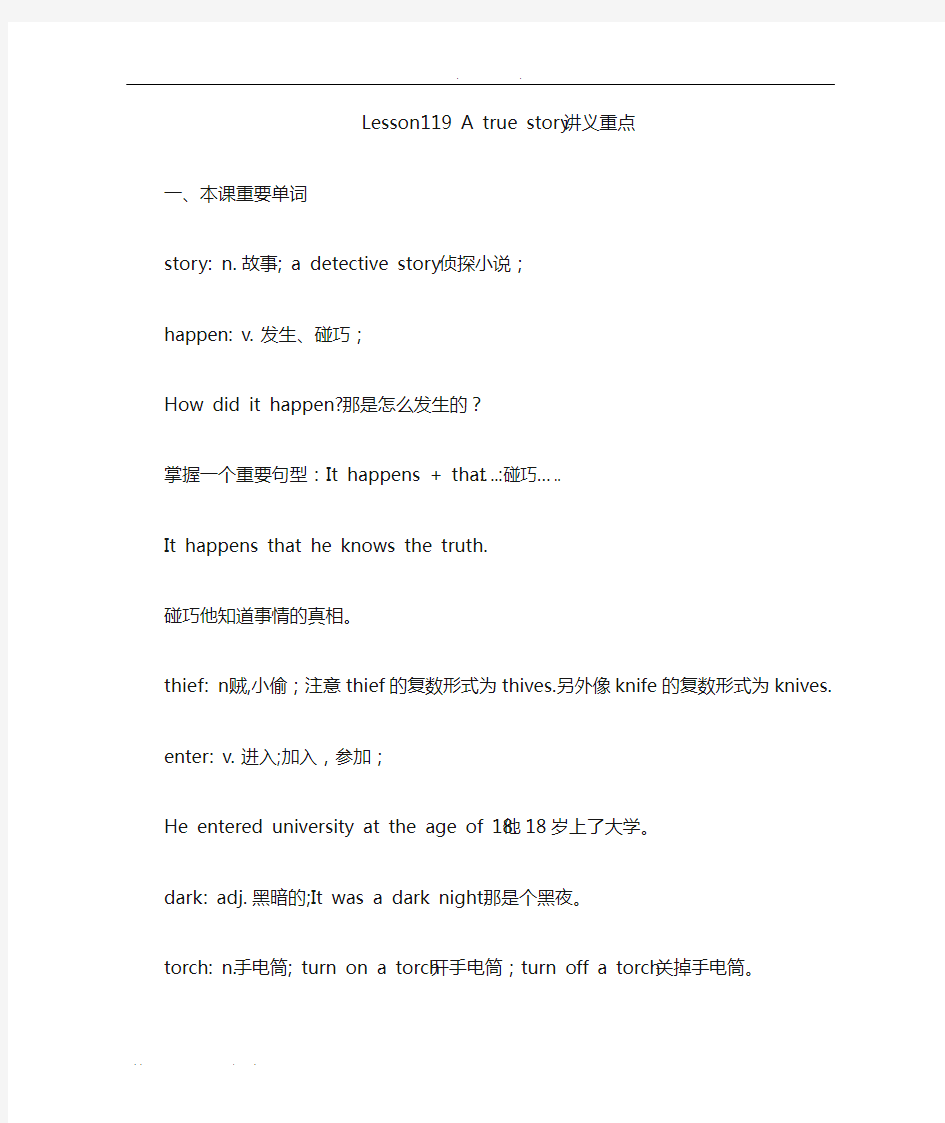

Lesson119 A true story讲义重点
一、本课重要单词
story: n. 故事; a detective story 侦探小说;happen: v. 发生、碰巧;
How did it happen? 那是怎么发生的?
掌握一个重要句型:It happens + that…..:碰巧…..
It happens that he knows the truth.
碰巧他知道事情的真相。
thief: n.贼,小偷;注意thief的复数形式为thives.另外像knife的复数形式为knives.
enter: v. 进入;加入,参加;
He entered university at the age of 18. 他18岁上了大学。
dark: adj. 黑暗的;It was a dark night. 那是个黑夜。torch: n.手电筒; turn on a torch开手电筒;turn off a torch关掉手电筒。
voice: n.声音; in an angry voice 以生气的声音;lose one’s voice:失声;
parrot: n. 鹦鹉;
二、本课重要知识点
1. I want to tell you a true story.
我想告诉你一个真实的故事。
在本句中我们要掌握tell的用法:
(1)tell sb sth=tell sth to sb:告诉某人某事。例:
I want to tell you something wonderful.
我想要告诉你一些好玩的事。
I want to tell something wonderful to you.
我想要告诉你一些好玩的事。
(2)tell sb to do sth:告诉某人去做某事;例:
She told me to finish my homework on time.
她告诉我要按时完成作业。
I told him to turn on the light.
我告诉他打开灯。
2. It happened to a friend of mine a year ago.
这是一年前发生在我的一个朋友身上的故事。
在本句中我们要掌握happen的具体用法:
(1)happen to sb:某事发生在某人身上;例:
She hoped nothing bad would happen to him.
她希望不会有坏事发生在他身上。
(2)happen to do sth:碰巧…….;
I happened to see him on the street.
我碰巧在大街上遇到他了。
(3)It happens + that……碰巧……:
It happens that the actor is her brother.
那个演员碰巧是她的哥哥。
It happens that she also likes swimming.
碰巧她也喜欢游泳。
3. 掌握以下重要短语:
A friend of mine:我朋友中的一个。
Turn on a torch:打开手电筒。
What’s up?: 什么事?
Run away:逃跑;
As quickly as possible:尽可能快地;
Come downstairs:下楼;
Go back to sleep:回去睡觉;
4.重要语法:过去完成时。
过去完成时指过去某一时刻或动作以前己经完成的动作,或由过去某一时间开始,一直延续到过去另一时间的动作或状态,主要用来表示“过去的过去”。
(一)基本结构
主语+had+动词的过去分词,例:
I had been at the bus stop for 20 minutes when a bus
finally came。我在车站等了20分钟,一辆公共汽车终于来了。
He left the room after he had turned off the light. 他把灯关上之后,离开了房间。
动词过去分词的规则变化:
①一般情况下,在动词后加ed构成:work / worked, stay / stayed, shout / shouted等。
②在以-e结尾动词后只加d:close / closed, like / liked, live / lived, smile / smiled等。
③以辅音字母加y结尾的动词,应将y改为i 再加-ed:study / studied, carry / carried等。
④以重读闭音节或r音节结尾且末尾只有一个辅音字母动词,要双写末尾的辅音字母再加-ed:stop / stopped, admit / admitted, refer / referred, prefer / preferred等。(二)基本用法:
过去完成时指过去某一时刻或动作以前己经完成的动作,或由过去某一时间开始,一直延续到过去另一时间的动作或状态,主要用来表示“过去的过去”。例:
He said he had been to Beijing twice.
他说他已经去过两次。(去这一动作在“说”之前已经完成,即“过去的过去”)
The bus had already left by the time I got there.
等我到那的时候,汽车已经开走了。
(汽车开走这一动作发生在我“到那”之前。)
He said he had worked in that factory since 1949.
他说自从1949年以来他就在那家工厂工作。
(由过去的时间1949一直延续到过去某一时间)
(三)句型转换
①在过去完成时做主句的情况下,把肯定句转换成疑问句只需要把had提到主语前面即可,例:
The bus had already left by the time I got there.(变疑问句)
等我到那的时候,汽车已经开走了。
Had the bus already left by the time you got there? 你到那的时候汽车已经开走了吗?
They had planted six hundred trees before last Wednesday
在上周三以前他们已经种了六百棵树了。
Had they planted six hundred trees before last Wednesday?
在上周三以前他们已经种了六百棵树了吗?
②在过去完成时做主句的情况下,把肯定句转换成疑问句只需要在had后面加not即可。例:
They had planted six hundred trees before last
Wednesday
在上周三以前他们已经种了六百棵树了。
They had not planted six hundred trees before last Wednesday
在上周三以前他们还没有种到六百棵树。
The bus had already left by the time I got there.
等我到那的时候,汽车已经开走了。
The bus had not left by the time I got there.
等我到那的时候,汽车还没有开走。
(四)标志词
过去完成时连用的时间状语有:
①by + 过去的时间点。
I had learnt six hundred words by last night.
②by the end of + 过去的时间点。
We had finished our work by the end of last term.
③before + 过去的时间点。
She had already left before I got there.